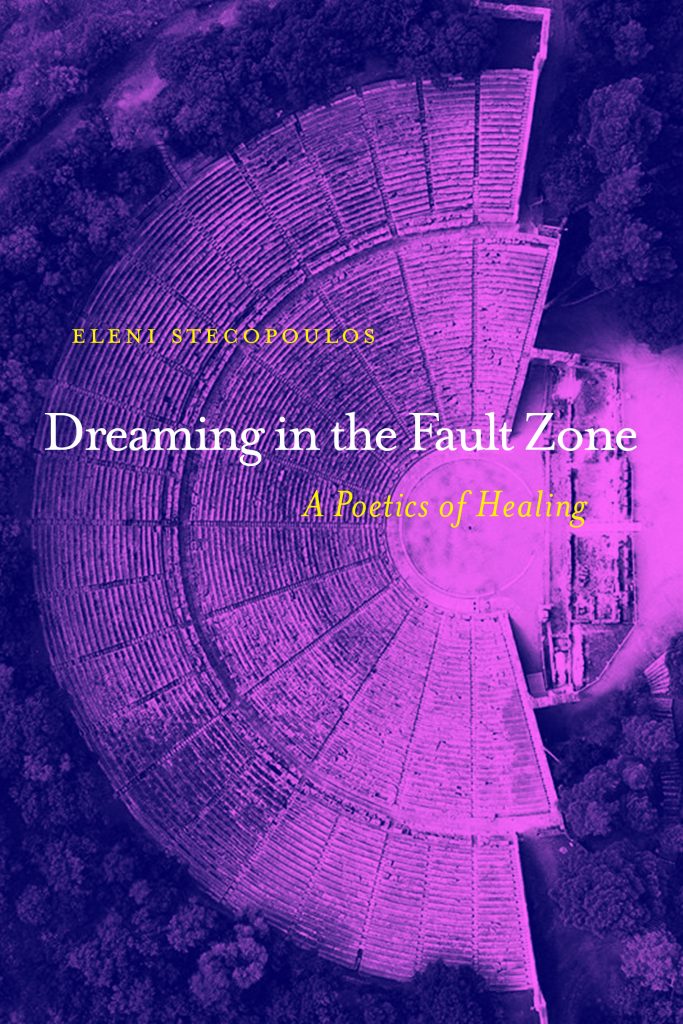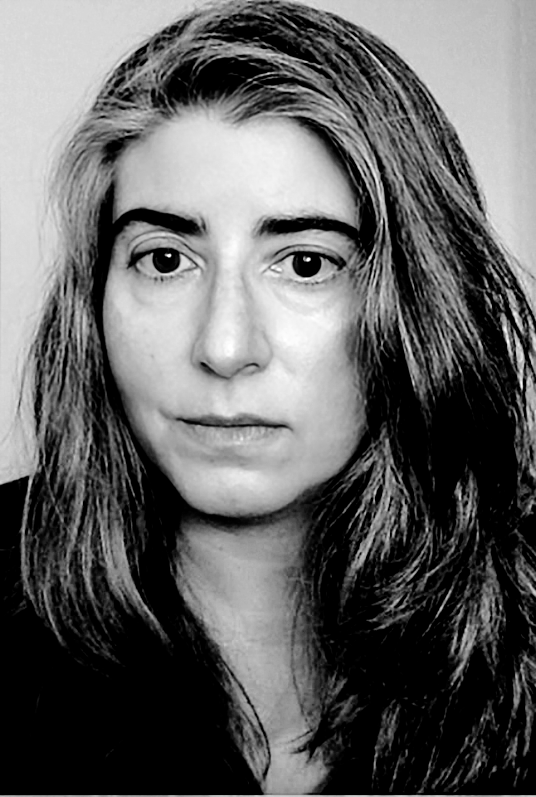“Outside of biomedicine, relationships lie at the core of healing—between people and their ancestors, between microcosm and macrocosm, between qualities and elements,” writes Eleni Stecopoulos in her new book, Dreaming in the Fault Zone: A Poetics of Healing. A poet, essayist, editor, critic, and UVA MFA alumna, Stecopoulos’ previous books include Visceral Poetics, a work of criticism and memoir, and Armies of Compassion, a poetry collection.
Dreaming in the Fault Zone is a deeply researched and heady collection of essays on illness and healing, written through the dual lenses of family history and personal chronic health conditions. Stecopoulos writes, “For twenty years I’ve contended with immune reactions to substances in both natural and built environments, assigned the diagnostic code of ‘environmental hypersensitivity.’” It is seemingly, in part, this diagnosis that sends her on the path that eventually leads to this book.
The author dedicates an especially effective essay in the book to a defense of sensitivity, noting, “Sensitivity is suspect to a masculinist society that mandates constant productivity and disembodiment.” Also countering that assumption by exploring how, simultaneously, “sensitivity signifies an exception that might be assigned value as social power, sacred dispensation, or creative gift.” It is in the space of this type of paradox or cultural clash that Stecopoulos is the most riveting. She draws influences and cites widely, from Asklepios, the Greek god of medicine, to Freud and Jungian analyst C. A. Meier, as well as modernist poet H.D. and feminist writer Silvia Federici, among countless other physicians, therapists, and historians.
It is also in this space outside of Western, masculinist, capitalistic norms that she seeks alternatives for healing her own body. Stecopoulos writes, “My refusal came after living an extroverted life under capitalism, forced to compete when I did not want, to ignore my body’s needs and boundaries, to override my sensitivity to the point of damage.” As for so many others, it took pushing beyond her own limits to seek out new ways of healing as well as more connected ways of living in community. “You’re a person because of, and with, others,” she writes.
Her examination of and experiences with some of these alternative forms of healing shapes much of the book. “All over the world there were realities that contradicted the pathological strictures of health I knew,” writes Stecopoulos. Through lyrical passages that incorporate verse and mythology, the book offers a survey of healing approaches used throughout time and across the globe, cataloging practices used by Kazakh shamans and healers in Bali, Mexico, Bolivia, Guatemala, Egypt, Greece, China, and elsewhere. “Sacred or secular, secret or shared, many medicines exist and people are healed by them,” she writes. Later adding that, “It is possible to learn from the methods of other cultures without viewing them as precursors or simplifying them into alternatives that provide escape from the ills of the West.”
Her examples tend to meander through these realms, mapping therapeutic landscapes, geo-mythologies, and geographies of healing, including spaces such as thermal baths, caves, natural springs, and other sacred spots. Alongside this, Stecopoulos offers insights into dream work and interpretation, rituals of purification, the laying on of hands, psychic surgery, somatics, remote acupuncture, and other methods of healing that are ultimately collective even as they appear to focus on an individual body. She also examines the healing properties of poetry, dance, music, theater, and experimental film, highlighting the idea that, like these artforms, medicine is a social practice. Considering the therapeutic properties of literature, specifically, she writes, “Words processed in the brain are felt in other organs.”

The COVID-19 pandemic is unapologetically woven throughout Dreaming in the Fault Zone as something that has changed and continues to change the patterns of society and our ideas of health and healing. She also grapples with immigration, incarceration, decolonization, ableism, medical racism, capitalism, and ecofascism, and does not shy away from documenting her own psychoanalysis and hypnotherapy as she navigates chronic illness, pain, and grief.
These specifics are shared in service to the author’s larger argument against toxic individualism and Western concepts of medicine and cures. She writes this section of verse early in the book:
“Healing is not
an accomplishment. victory.
the antithesis of illness.
Healing cannot
undo the disaster. reverse time.”
Stecopoulos is careful to distinguish between healing and cures, holding space for non-Western approaches that can be informed more broadly by the world we live in. “The plant speaking to the shaman is also empirical data,” she writes. Specifically, she positions healing as a continuum that is as nonlinear and collective as human life, in contrast to the idea of cures as an ableist construct that is unrealistically focused on eradicating illness and restoring a pre-illness self. The latter is often the primary focus of Western medicine, but Stecopoulos argues it is this steadfast focus on cures and quantitative data that ultimately harms many of the potential opportunities we have for the slower processes of holistic healing and building community. “Treating people requires, ultimately, treating the structures that form their person, tone their immune system, impoverish their gut flora, teach their nervous system a restricted set of responses,” she writes.
An enthralling, existential endeavor, Dreaming in the Fault Zone is notable in its range and the depth of humanity and community conveyed through the author’s examinations of the most universal experiences we share: illness and healing. As Stecopoulos writes, “Healing is not an attempt to change history but an ongoing practice endemic to life. Healing is our condition.”
